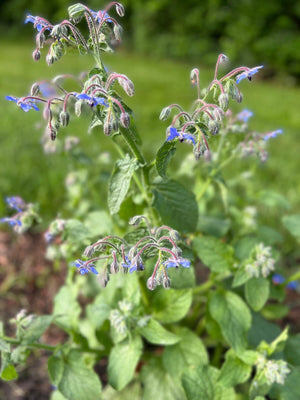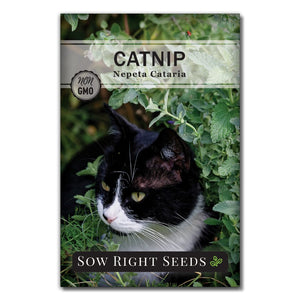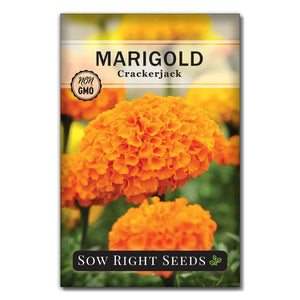7 Natural Ways to Get Rid of Aphids Before They Destroy Your Plants
PestsYou've nurtured your seedlings, and they're starting to take off. But then you spot curled leaves and sticky residue. Yep, it's aphids.
Aphids are a common garden pest that can do serious damage if ignored. The good news is you don't need harsh chemicals to fight back. These natural methods of aphid control can help save your garden.

Table of contents
Getting Rid of Aphids Naturally
We’ve been gardening for years, and aphids have always been around. While they’re a persistent problem, we’ve learned to manage them without using toxic pesticides.
One year, we made the classic mistake of bringing an outdoor plant inside to overwinter. Unfortunately, it was harboring aphids. By the time we started our indoor seeds, our grow station was already crawling with them.
It was a mess. We had to wash every leaf, scrub containers, and clear out every bit of leftover soil in the room. It was frustrating, but it taught us a lot. We tried every natural method we could, including bringing in ladybugs. Little by little, we got rid of all the aphids.
Here’s what we learned the hard way:
Inspect outdoor plants carefully before bringing them inside for the winter.
Clean your grow station thoroughly before starting seeds.
Remove all old soil and plant debris —aphids love to hide in it.
Act fast at the first sign of aphids—they won’t wait around to multiply.
Be persistent. Natural methods take a little time, but they work!

Understanding Aphids and Their Impact on Your Garden
Aphids are small, soft-bodied insects that feed on the sap of plants, causing damage to leaves, stems, and flowers. They are commonly found on roses, vegetables, and fruit trees and can quickly multiply in warm, humid conditions. There are over 4,000 species of aphids, each with their own unique appearance and feeding habits. Some species are more damaging than others, but all can cause significant harm to your plants if left unchecked.
Aphids reproduce quickly, with each female capable of producing up to 80 offspring in just a few weeks. They feed on the phloem sap of plants, which can cause yellowed or curled leaves, stunted growth, and reduced yields. In addition to causing direct damage to plants, aphids are also known to transmit plant viruses, which can further harm your garden.

Signs of an Aphid Infestation
The first step in controlling aphids is identifying the signs of an infestation. Aphids are small and often difficult to spot, but there are several signs that can indicate their presence. The most obvious sign of an aphid infestation is the presence of aphids themselves. Aphids generally feed in large groups, so look for clusters of small, soft-bodied insects. Check closely on the undersides of leaves, along stems, and around buds and flowers.
Another sign of aphids is sticky, shiny leaves. Aphids secrete a sweet, sticky substance called honeydew as they feed, which can coat leaves and attract other pests like ants. This honeydew can also cause a fungal growth called sooty mold. If you notice a shiny film on your plants, it could be a sign of an aphid infestation. You may also see a significant presence of ants. Ants love to eat the honeydew and will even protect the aphids so they can enjoy this sweet substance.
Finally, look for signs of plant damage. Aphids can cause yellowed or curled leaves and stunted growth. If you notice any of these symptoms, it's important to take action to control the aphids before they cause more damage.

How to Get Rid of Aphids Naturally in Your Vegetable Garden
Aphids multiply quickly, so don’t wait to fight back. Start with one of these methods as soon as you find them snacking on your vegetables.
These natural methods for getting rid of aphids each have their pros and cons. You will want to consider the specific plant to decide which method to try.
1 - Use a Strong Blast of Water to Remove Aphids
One of the simplest and most effective ways to get rid of aphids in your garden is to use a strong blast of water. Simply spray your plants with a hose, focusing on the undersides of leaves where aphids tend to congregate. This will knock the aphids off the plant and disrupt their feeding patterns. Repeat this process every few days until the aphid population is under control.
Pros: This method works exceptionally well and is quick.
Cons: A strong stream of water on delicate plants can cause damage. Adjust the water pressure to the capacity of the plant.
2 - Pick Aphid Eggs and Aphids Off by Hand
Aphids don’t move quickly, so it’s easy to just pick them off whenever you see them. You can wear rubber gloves and wipe them off into a bucket of soapy water. If you see heavily infested leaves, it may be better just to cut them off. This can be necessary for lettuce and cabbage.
Pros: It gets rid of the aphids and eggs to disrupt the life cycle and stop them in their tracks.
Cons: You have to stay on top of it and have good eyes.

3 - Apply Neem Oil
Neem oil is a natural insecticide that can be effective in controlling aphids. It works by disrupting the aphids' hormonal balance, making it difficult for them to feed and reproduce.
To use neem oil, mix it with water according to the instructions on the bottle and spray it onto your plants, focusing on the areas where aphids are present. Be sure to soak the underside of leaves where aphids lay their eggs. Repeat this process every few days until the aphids are gone. Be sure to apply neem oil in the early morning or late evening, as direct sunlight can cause it to break down quickly.
Pros: This simple spray is easy to use.
Cons: Neem oil can affect beneficial pollinators such as bees & butterflies.
4 - Use Homemade Soap Solutions
Another natural way to get rid of aphids in your garden is to make a soap solution. Mix a few drops of pure castile soap with water in a spray bottle and shake well. Spray the solution onto your plants, focusing on the areas where aphids are present. The soap will suffocate the aphids and cause them to die off. Be sure to rinse your plants with water after a few hours to prevent any damage to the leaves. Repeat this process every few days until the aphids are gone.
Essential oils can also be added to homemade solutions. For example, peppermint, clove, rosemary, thyme, and hot pepper are essential oils that can be helpful pest deterrents.
Pros: Homemade sprays are nontoxic, and use what you already have.
Cons: Soap sprays need to make contact with the aphids to kill them.
5 - Repel and Kill Aphids with Garlic Spray
Garlic spray is a natural and effective way to get rid of aphids in your garden. Garlic is a natural fungicide, high in sulfur which is toxic to aphids, and has allicin which confuses sensory receptors.
To make a garlic spray, smash 4 or 5 garlic cloves. Pour 4 cups of boiling water over the garlic and allow it to sit overnight. Strain out the garlic and add 2 tablespoons of castile soap to the garlic water. Pour this into a spray bottle.
Spray the garlic mixture onto your plants, focusing on the areas where aphids are present. The pungent odor of garlic will repel the aphids and prevent them from coming back. Repeat this process every few days until the aphids are gone.
Pros: The smell can deter aphids and other pests. The contact with the sulfur and soap will kill the aphids and eggs.
Cons: The garlic smell. Too much can also be toxic to other beneficial insects.

6 - Introduce Natural Predators to Eat Aphids
One of the most effective ways to control aphids in your garden is to introduce beneficial insects that prey on them. Ladybugs, lacewings, and parasitic wasps are all natural predators of aphids and can help keep their populations in check.
Ladybugs are perhaps the most well-known beneficial insect for controlling aphids. They feed on aphids and can consume up to 50 per day. Lacewings are also effective at controlling aphids and can be purchased as adults or as eggs, which will hatch into larvae that feed on aphids. Finally, parasitic wasps are another effective predator of aphids. They lay their eggs inside aphids, which hatch and consume the aphids from the inside out. Be sure to provide them with a habitat by planting flowers that attract them, such as dill, fennel, and yarrow.
Birds such as chickadees and nuthatches will feast on aphids.
Pros - Natural predators keep your garden organic.
Cons - You can’t control nature and make them come precisely when you want. But by providing a habitat they prefer, you’ll see the benefits.
7 - Practice Companion Planting to Control Aphids
Companion planting is the practice of planting different crops together in the same space to improve the health and productivity of your garden. It can also be used to deter pests, including aphids.
Marigolds, for example, are known to repel aphids and can be planted alongside your other crops to deter them. Other plants, such as mint, catnip, chives, and garlic, are also effective at repelling aphids and can be planted in your garden for added protection. In addition, zinnias, cosmos, and nasturtium are beautiful flowers that will trap aphids.
Pros: Works well for many kinds of aphids and benefits your plants.
Cons: Not all types of aphids are affected by these companion plants. You may have to try different plants for specific kinds of aphids.

Preventing aphids from returning
Once you've successfully controlled an aphid infestation, it's important to take steps to prevent them from returning. One of the best ways to prevent aphids from returning is to keep your garden clean and free of debris. Aphids are attracted to areas with high humidity and debris, so keeping your garden neat and well-maintained can help keep them at bay. You can also prevent aphids from returning by practicing good plant hygiene. This includes regularly inspecting your plants for signs of an infestation, removing any infected plants, and rotating your crops to prevent the buildup of pests and diseases.
Maintaining a healthy and thriving garden with aphid control
Aphids love to suck on young, tender growth and are frustrating to see in the garden. Some years it seems like there are very few, and they don’t eat much. But in other years, they seem to be everywhere. So start checking early and look for the signs. If you see lots of ants, sticky, shiny leaves, or curled and yellowed leaves, start using these natural methods to get rid of aphids.
If you're dealing with aphids, we've been there. We know how frustrating it can be that something so small can cause such a big problem. We hope the tips we've shared from our own trial and error help you tackle aphids naturally in your garden and indoor grow space. You've got this! With a little persistence and patience, you can have a thriving garden.
If you liked this post, share it with your gardening friends!








Seems like every year these little pests ruin beautiful plants in my garden! Neem oil smells like a skunk… lol. This year I’m going to be very diligent about keeping things clean in my garden! Let’s see what happens.
I have never had luck with the strong stream of water. Has anyone else actually had success with this method? Even indoor plants with aphids (basil in my case) I wash off under the faucet and rub my fingers to loosen them, they are back in a few days.
This year, I planted a bed of garlic on each side of my kale. I covered the kale starts with fine mesh netting. Darned if I just picked some of my kale and found aphids. I ended up pulling all the leaves on that particular plant and hand smushing any sign of an aphid. I checked the other plants and they were mostly OK. It is early in the season, so hopefully they won’t be back but I will surveil every week.
The only thing that I have done to make sure I am rid of them, especially with a heavy infestation, is pull up the plant and dip it in boiling water.
Leave a comment